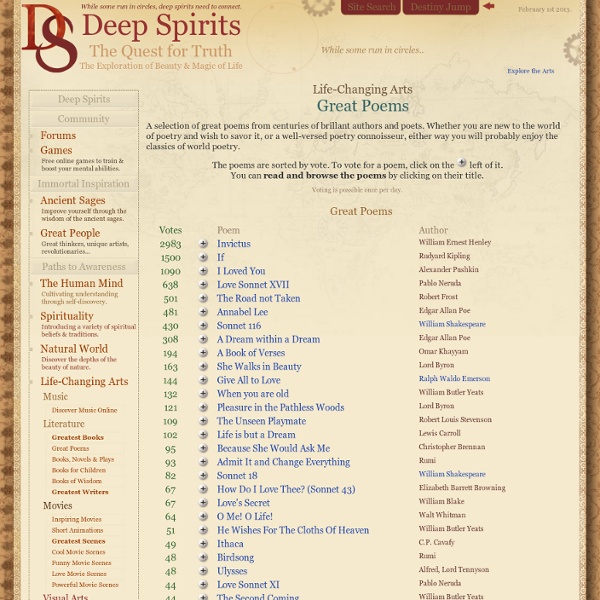Deep Underground Poetry : Welcome Siharyvani - Deep Underground Poetry Community
Any questions? Help Advanced Search
Do not stand at my grave and weep
Do Not Stand at My Grave and Weep is a poem written in 1932 by Mary Elizabeth Frye. Although the origin of the poem was disputed until later in her life, Mary Frye's authorship was confirmed in 1998 after research by Abigail Van Buren, a newspaper columnist.[1] Full text[edit]
The world's most awesome igloo.
Pegman vs. Clippy. SCORE 141
New Page 1
Back to ContentsRubik's Cube Solution: How to put together a mixed-up Rubik's cube, most of the time with your eyes closed, and manipulating the cube above your head, or behind your back. My record time using this method was 2 minutes 13 seconds. Just memorize the following formula (it's easy!)
Banned Books Online
presents Welcome to this special exhibit of books that have been the objects of censorship or censorship attempts. The books featured here, ranging from Ulysses to Little Red Riding Hood, have been selected from the indexes of The Online Books Page.
postmodernism in poetry
To repeat a previous simplification: whereas Classicism, Realism and Romanticism all deal with the outside world, contemporary literature, by contrast, is commonly a retreat into the writer's consciousness — to make autonomous creations that incorporate diverse aspects of modern life (Modernism), or free-wheeling creations constructed of a language that largely points to itself (Postmodernism). Postmodernism began in the sixties, when there developed on both sides of the Atlantic a feeling that poetry had become too ossified, backward-looking and restrained. {1} The old avant garde had become respectable, replacing one orthodoxy by another. The poetry commended by the New Criticism — and indeed written by its teachers — was self-contained, coherent and paradoxical. Certainly it was clever, with striking imagery, symbolism and structural economy, but it was also far too predictable. Where were the technical innovations of the early modernists?
Though I Am Young and Cannot Tell
accent: emphasis given a syllable in ordinary usage, as provided by a pronouncing dictionary. See also stress. accentual-syllabic:
List of British words not widely used in the United States
Wikipedia glossary This is a list of British words not widely used in the United States. In Canada, New Zealand, India, South Africa, and Australia, some of the British terms listed are used, although another usage is often preferred. Words with specific British English meanings that have different meanings in American and/or additional meanings common to both languages (e.g. pants, cot) are to be found at List of words having different meanings in American and British English. When such words are herein used or referenced, they are marked with the flag [DM] (different meaning).Asterisks (*) denote words and meanings having appreciable (that is, not occasional) currency in American English, but are nonetheless notable for their relatively greater frequency in British speech and writing.British English spelling is consistently used throughout the article, except when explicitly referencing American terms.



